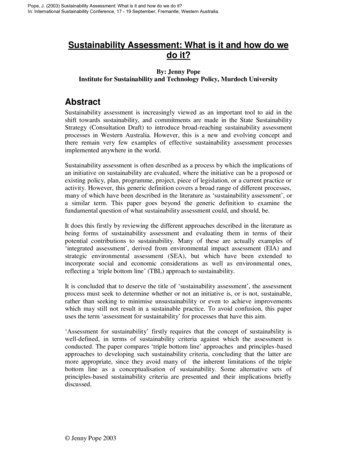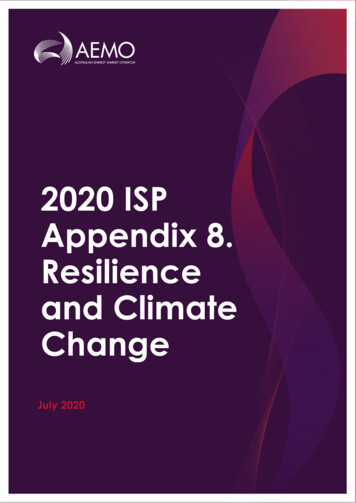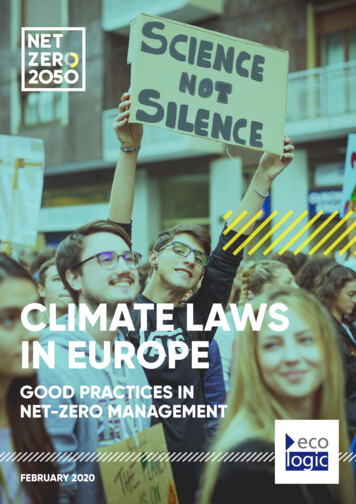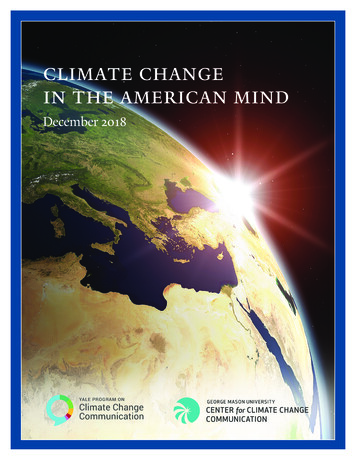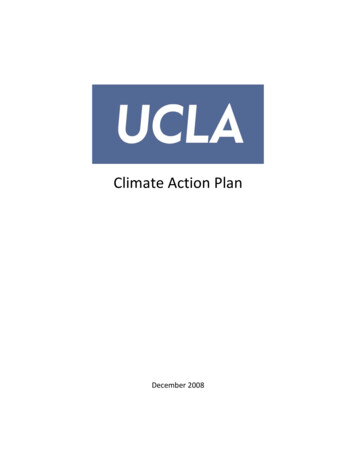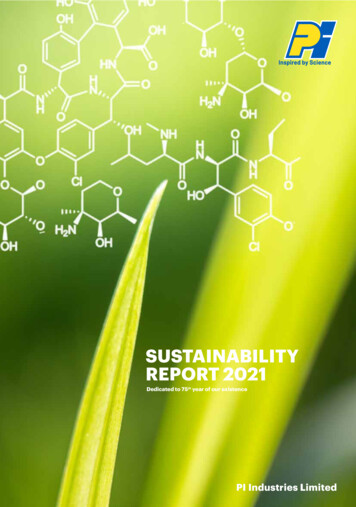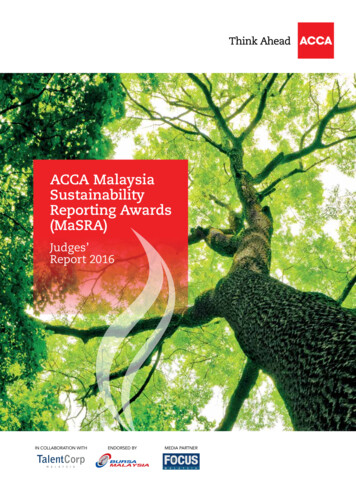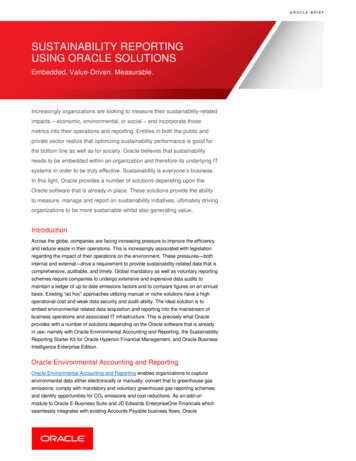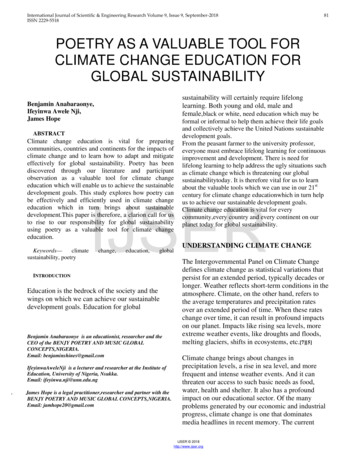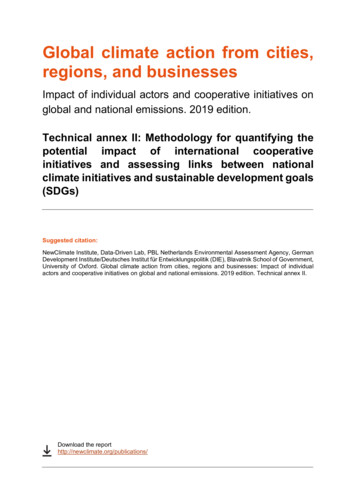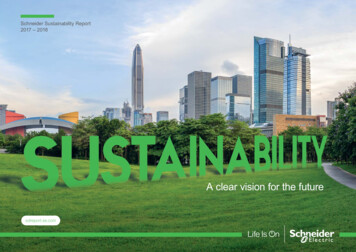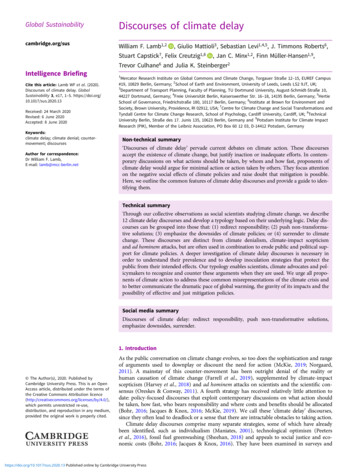
Transcription
Global SustainabilityDiscourses of climate delaycambridge.org/susWilliam F. Lamb1,2, Giulio Mattioli3, Sebastian Levi1,4,5, J. Timmons Roberts6,Stuart Capstick7, Felix Creutzig1,8, Jan C. Minx1,2, Finn Müller-Hansen1,9,Trevor Culhane6 and Julia K. Steinberger2Intelligence BriefingCite this article: Lamb WF et al. (2020).Discourses of climate delay. GlobalSustainability 3, e17, 1–5. https://doi.org/10.1017/sus.2020.13Received: 24 March 2020Revised: 6 June 2020Accepted: 8 June 2020Keywords:climate delay; climate denial; countermovement; discoursesAuthor for correspondence:Dr William F. Lamb,E-mail: lamb@mcc-berlin.net1Mercator Research Institute on Global Commons and Climate Change, Torgauer Straße 12–15, EUREF Campus#19, 10829 Berlin, Germany; 2School of Earth and Environment, University of Leeds, Leeds LS2 9JT, UK;3Department of Transport Planning, Faculty of Planning, TU Dortmund University, August-Schmidt-Straße 10,44227 Dortmund, Germany; 4Freie Universität Berlin, Kaiserswerther Str. 16–18, 14195 Berlin, Germany; 5HertieSchool of Governance, Friedrichstraße 180, 10117 Berlin, Germany; 6Institute at Brown for Environment andSociety, Brown University, Providence, RI 02912, USA; 7Centre for Climate Change and Social Transformations andTyndall Centre for Climate Change Research, School of Psychology, Cardiff University, Cardiff, UK; 8TechnicalUniversity Berlin, Straße des 17. Junis 135, 10623 Berlin, Germany and 9Potsdam Institute for Climate ImpactResearch (PIK), Member of the Leibniz Association, PO Box 60 12 03, D-14412 Potsdam, GermanyNon-technical summary‘Discourses of climate delay’ pervade current debates on climate action. These discoursesaccept the existence of climate change, but justify inaction or inadequate efforts. In contemporary discussions on what actions should be taken, by whom and how fast, proponents ofclimate delay would argue for minimal action or action taken by others. They focus attentionon the negative social effects of climate policies and raise doubt that mitigation is possible.Here, we outline the common features of climate delay discourses and provide a guide to identifying them.Technical summaryThrough our collective observations as social scientists studying climate change, we describe12 climate delay discourses and develop a typology based on their underlying logic. Delay discourses can be grouped into those that: (1) redirect responsibility; (2) push non-transformative solutions; (3) emphasize the downsides of climate policies; or (4) surrender to climatechange. These discourses are distinct from climate denialism, climate-impact scepticismand ad hominem attacks, but are often used in combination to erode public and political support for climate policies. A deeper investigation of climate delay discourses is necessary inorder to understand their prevalence and to develop inoculation strategies that protect thepublic from their intended effects. Our typology enables scientists, climate advocates and policymakers to recognize and counter these arguments when they are used. We urge all proponents of climate action to address these common misrepresentations of the climate crisis andto better communicate the dramatic pace of global warming, the gravity of its impacts and thepossibility of effective and just mitigation policies.Social media summaryDiscourses of climate delay: redirect responsibility, push non-transformative solutions,emphasize downsides, surrender.1. Introduction The Author(s), 2020. Published byCambridge University Press. This is an OpenAccess article, distributed under the terms ofthe Creative Commons Attribution /),which permits unrestricted re-use,distribution, and reproduction in any medium,provided the original work is properly cited.As the public conversation on climate change evolves, so too does the sophistication and rangeof arguments used to downplay or discount the need for action (McKie, 2019; Norgaard,2011). A mainstay of this counter-movement has been outright denial of the reality orhuman causation of climate change (Farrell et al., 2019), supplemented by climate-impactscepticism (Harvey et al., 2018) and ad hominem attacks on scientists and the scientific consensus (Oreskes & Conway, 2011). A fourth strategy has received relatively little attention todate: policy-focused discourses that exploit contemporary discussions on what action shouldbe taken, how fast, who bears responsibility and where costs and benefits should be allocated(Bohr, 2016; Jacques & Knox, 2016; McKie, 2019). We call these ‘climate delay’ discourses,since they often lead to deadlock or a sense that there are intractable obstacles to taking action.Climate delay discourses comprise many separate strategies, some of which have alreadybeen identified, such as individualism (Maniates, 2001), technological optimism (Peeterset al., 2016), fossil fuel greenwashing (Sheehan, 2018) and appeals to social justice and economic costs (Bohr, 2016; Jacques & Knox, 2016). They have been examined in surveys andhttps://doi.org/10.1017/sus.2020.13 Published online by Cambridge University Press
2William F. Lamb et al.Fig. 1. A typology of climate delay discourses.community workshops (Bickerstaff & Walker, 2002; Norgaard,2011), in media sources and advertisements (Bohr, 2016;Jacques & Knox, 2016; Peeters et al., 2016; Sheehan, 2018) andin lobbying activities and political discourses (Bache et al.,2015; Gillard, 2016; McKie, 2019), using methods such as contentanalysis (Bohr, 2016; Jacques & Knox, 2016), grounded theory(Bickerstaff & Walker, 2002) and the analysis of social deviance(McKie, 2019). Many delay arguments are documented in keyworks tracing the history of environmental counter-movementsin the USA, including the Merchants of Doubt, Deceit andDenial, The Triumph of Doubt and others (Brulle & Aronczyk,2019; Freudenburg et al., 2008; Markowitz & Rosner, 2003;Michaels, 2008, 2020; Oreskes & Conway, 2011).Our goal in this article is simply to identify an expansive –albeit not necessarily exhaustive – list of climate delay discourses.In doing so, we follow similar efforts to compile common climatedenial claims and provide a reference point for countering misinformation (www.skepticalscience.com). Our secondary goal is toexamine the common features and shared underlying logic ofdelay discourses. This allows us to condense them into a set ofoverarching strategies that can be more easily recognized andhence challenged. Our approach is deductive: we derive our initiallist of discourses from an expert elicitation of the studyhttps://doi.org/10.1017/sus.2020.13 Published online by Cambridge University Pressco-authors, and then we refine these categories by drawing froma wide range of sources. These include a systematically collectedsample of written testimony (submitted to Massachusetts legislature on climate and clean energy legislation in the period2013–2018), as well as selected news articles and media contenton climate policies in Germany, the UK, Norway and the USA.Refer to the Supplementary Materials for a more detailed explanation of our methods and sources.Climate delay discourses repeatedly occur across sources, actorsand contexts. What features do they share? Based on the underlying logic they use to discourage climate action, we characterizediscourses of delay as negations of at least one of four questions:(1) Is it our responsibility to take actions? (2) Are transformativechanges necessary? (3) Is it desirable to mitigate climate change,given the costs? (4) Is it still possible to mitigate climate change?The varying positions to these fundamental questions allow us togroup discourses into four categories that ‘redirect responsibility’,‘push non-transformative solutions’, ‘emphasize the downsides’ ofclimate policy, or ‘surrender’ to climate change (see Figure 1).This typology assists in the identification of diverse discursivestrategies and may suggest tailored responses to each. These questions also cut to some of the most contentious aspects of socialand political change; they indicate that discourses of delay often
Global Sustainabilitycontain partial truths and may be put forward in good faith. Yetour focus here is to identify the features of these discourses, ratherthan to attribute underlying motives to those who use them. Inthe absence of high-quality public deliberation, and in thehands of interest groups fighting against regulation, our concernis that discourses of delay will disorientate and discourage ambitious climate action. This issue thus demands urgent attentionand a new set of responses to facilitate a more robust publicdebate on climate change mitigation (Farrell et al., 2019; vander Linden et al., 2017). In the following sections, we discussthe main features of our typology and the 12 discourses ofdelay. Attributions for the quotes, as well as a more extensivelist of examples, can be found in the Supplementary Materialfor this article.2. Redirect responsibilityWho is responsible for taking climate action? Policy statementscan become discourses of delay if they purposefully evade responsibility for mitigating climate change. A prominent example isindividualism, which redirects climate action from systemic solutions to individual actions, such as renovating one’s home ordriving a more efficient car. This discourse narrows the solutionspace to personal consumption choices, obscuring the role ofpowerful actors and organizations in shaping those choices anddriving fossil fuel emissions (Maniates, 2001). Blame shifting inthis way can be explicit – “Yale’s guiding principles are predicatedon the idea that consumption of fossil fuels, not production, isthe root of the climate change problem” (Yale University). Butit can also be implicit, such as in the social media campaignrun by BP – “Our ‘Know your carbon footprint’ campaign successfully created an experience that not only enabled people todiscover their annual carbon emissions, but gave them a funway to think about reducing it – and to share their pledge withthe world.”This is not to suggest that individual actions are futile. Rather,a more productive discourse of responsibility would focus attention on the collective potential of individual actions to stimulatenormative shifts and build pressure towards regulation. It wouldalso recognize that regulations and structural shifts are complementary to supporting individual behaviour change.A second widely deployed discourse argues that other countries or states produce more greenhouse gas emissions and thusbear a greater responsibility for taking action. We call this whataboutism. Actors advancing this discourse often deploy statisticsdemonstrating their own small contribution to global emissions,or they point to large emitters such as China – “We are a nationthat produces 1.8 per cent of global carbon dioxide, so I do not getclosing down our aluminium smelters, most of our steel production, and now our refining industry ” (UK politician NigelFarage). Industries and sectors can also leverage this argument.Transport organizations call for the agriculture sector to take priority actions – “A CO2-price might be a good idea in principle,but we think it does not work if the land transport sector issingled out. First one should see that agriculture is includedtoo” (anonymous quote, board member of a car manufacturer)– while agricultural organizations do the exact opposite – “Everwonder why farmers feel targeted when it comes to climateaction? Have a look at data from yesterday’s @EPAIreland climatereport. Clearly, the first climate action we can all do is use carswhich are less carbon intensive. #backingfarming” (IrishFarmers Association Twitter account).https://doi.org/10.1017/sus.2020.13 Published online by Cambridge University Press3An underlying concern in these narratives is the ‘free rider’problem: unless all individuals, industries or countries undertakeemissions reductions, some will stand to benefit from the actionsof others. We see this more explicitly formulated in the ‘free rider’excuse discourse, which claims that others will actively takeadvantage of those who lead on climate change mitigation –“[I]f we stopped emitting altogether tomorrow, not only itwould have no impact but undoubtedly other countries wouldsimply increase their emissions” (Josh Manuatu, president ofthe Australian Young Liberals). In Donald Trump’s words, theParis Agreement is “less about the climate and more aboutother countries gaining a financial advantage over the UnitedStates.”These three ‘redirect responsibility’ discourses grapple with thereal challenge of building a fair and comprehensive response toclimate change. Yet too often they set unrealistic conditions fortaking action, implying that others should take the lead beforewe consider action ourselves. In doing so, they downplay orshirk short-term entry points to climate engagement and policy,including the considerable advantages gained by multiple entitiesacting together across scales.3. Push non-transformative solutionsAre transformative changes necessary? Policy statements canbecome discourses of delay when they promote ineffective solutions and thereby draw attention away from more substantialand effective measures. Technological optimism is a primeexample, holding that technological progress will rapidly bringabout emissions reductions in the future. This discourse hasmany variations, from touting recent progress in renewableenergy deployment, to promoting technological ‘myths’ that failto manifest in the promised timeframe and tend to be substitutedby new ones (e.g., zero-carbon planes, fusion power and direct aircapture of greenhouse gases) (Peeters et al., 2016), to even morevague suggestions that “human ingenuity is infinite,” even ifEarth’s resources are not (Cato Institute commentary). Such optimism and faith may be warranted in some cases, but this discourse is often accompanied by empirically unsupported claims:for instance, that technological progress requires only marketbased incentives, rather than regulation; that breakthroughs areimminent (“I am told that electric planes are on the horizon,”UK Health Secretary Matt Hancock); or that rapid renewabledeployment makes stringent policies or demand reduction measures unnecessary.A failure to acknowledge disruptive approaches to climatemitigation can also be seen in fossil fuel solutionism, the claimthat the fossil fuel industry is “part of the solution to the scourgeof climate change” (OPEC Secretary General MohammedBarkindo). This discourse is at the heart of industry pushbackagainst regulation. The American Petroleum Institute funds tensof millions of dollars’ worth of advertisements that promote‘cleaner’ fossil fuels, while emotively linking these products toeveryday activities and human well-being (Sheehan, 2018). Thisnarrative stands in stark contrast to the established evidence –that new freely emitting fossil infrastructures are incompatiblewith the Paris Agreement’s target of 1.5 C warming.Another key strategy here is to establish narrow definitions ofsuccess, so that a country or industry can declare their leadershipin the fight against climate change. We call this all talk, littleaction, a discourse that points to recent advances in loweringemissions (often based on relative measures) or in setting
William F. Lamb et al.4ambitious climate targets, thus downplaying the need for morestringent or new types of additional action (Gillard, 2016).Ambitious long-term target setting may satisfy domestic demandsfor climate policy, but without concrete instruments, these targetsare not guaranteed to translate into action on the ground (Bacheet al., 2015). This strategy is apparent, for example, when the UKgovernment responds to a specific parliamentary question on climate policy by arguing, “The UK has a world-leading record intackling climate change. We are rightly proud of our performanceagainst our carbon targets We remain firmly committed totackling the threat of climate change,” while not providing anydirect response to the question asked.On a more ideological level, many actors appear to shy awayfrom restrictive policies altogether. A discourse of no sticks, justcarrots argues that we should only pursue voluntary policies (‘carrots’), in particular those that expand consumer choices, such asfunding high-speed rail to substitute flights. More obviouslyrestrictive measures (‘sticks’) such as taxes or a frequent-flyerlevy are deemed too ‘paternalistic’ and overburdening for citizens.This discourse argues that such measures should be abandoned,despite the complementarity between ‘carrots’ and ‘sticks’ andthe need for both approaches under strong climate policy. Agood illustration is the German Free Democratic Party’s strategyon climate action, which emphasizes that “greater efficiencyreduces energy, resource use, and emissions, while improvingquality of life,” but refuses to “prescribe sustainable behaviourthrough regulations.”The push towards incremental solutions tends to avoid alloptions that are most threatening to existing power structuresand practices. In doing so, these discourses leverage narrow definitions of success, positive framings and entrepreneurial valuesabove transformative efforts and binding standards. When notconfronted with scientific deliberation and debate on appropriatepolicy options, they provide cover for ongoing unsustainableactivities and hinder strong near-term climate action.4. Emphasize the downsidesGiven the costs, is it desirable to mitigate climate change? Policystatements can become discourses of delay when they emphasizethe downsides of climate action and imply that these carry aneven greater burden for society than the consequences of inaction.This fallacy is at risk of occurring in many contemporary discussions on the potential social effects of climate policies, such as onemployment, prospects of foregone consumption, general prosperity and ‘ways of life’. In particular, this framing may resonatefor low-income members of society, marginalized communitiesand developing nations.The appeal to social justice moves social impacts to the forefront of policy discussions, framing a transition to renewableenergy as burdensome and costly to society: “we can’t allow climate protection to jeopardize prosperity and jobs” (GermanMinister for Economic Affairs and Energy Peter Altmaier).Such issues are a legitimate and crucial aspect of climate policydeliberation, so one should carefully address these claims. Forinstance, are other aspects of injustice addressed in such discourses, such as failing to act on climate change? Are the potentialbenefits of a transition disregarded, such as improved publichealth, regional development and employment opportunities, orgreater community resilience? A discourse of delay would fail todo so on both counts, focusing attention only on the short-termdownsides and costs. Climate policies can also be falsely framed ashttps://doi.org/10.1017/sus.2020.13 Published online by Cambridge University Pressregressive. For instance, it has been claimed that an aviation taxwould “hammer hard-working families and prevent them fromenjoying their chance to go abroad” (UK Treasury ministerRobert Jenrick), despite this being one of the most progressiveof all potential green taxes on consumption.The appeal to well-being manifests an extreme version of thisdiscourse. It claims that climate policy threatens fundamentallivelihoods and living standards: “if fossil fuel use were to endtomorrow, the economic consequences would be catastrophic(starvation would follow, for example, as tractors’ fuel tanks randry)” (David J. O’Donnell, Associate Director, MassachusettsPetroleum Council). This is clearly overstating the disruptivenature of an orderly transition process, and it is linked to ongoingefforts to situate fossil fuels as the irreplaceable foundation ofhuman well-being and poverty reduction – “Abandoning fossilfuels as quickly as possible, as many environmental activistsdemand, would slow the growth that has lifted billions of peopleout of poverty” (Bjørn Lomborg, President, CopenhagenConsensus Centre). Organizations from Peabody Energy to theinfluential Southern Baptist Convention have leveraged sucharguments to downplay or deny the need for global climate action(Supplementary Information, Section 3.9).The consequence of these concerns is a highly conservativeapproach to climate policymaking – policy perfectionism. Here,one argues for disproportional caution in setting ambitious levelsof climate policy in order not to lose public support – as whenGerman Minister for Economic Affairs and Energy Altmaierdefends a low carbon price on the basis that “we also have aresponsibility for social peace in this country.” Again, thismight be a sensible claim, but it becomes a delay strategy whenthe advocate forgoes the need for outreach work and a publicdeliberation strategy that could reach consensus on just policiesand build support towards more ambitious solutions.Emphasizing the downsides of climate action in these ways thusdeflects attention from the harm they avoid, while denying orignoring the potential to build inclusive policies that capturesocial benefits and reach wide acceptance.5. SurrenderIs climate change mitigation actually feasible? Policy statementscan become discourses of delay if they raise doubt that mitigationis (still) possible, pointing to seemingly insurmountable political,social or biophysical challenges. There are two ways to developthis final narrative. First, one could claim that strong climate policies will impinge on society, politics or human nature to theextent that their final implementation is doomed to failure. Wecall this change is impossible, a discourse that reifies the currentstate of things and denies the ability of societies to organizelarge socio-economic transformations: “To stop emitting wastecarbon completely within the next five or 10 years, we wouldneed to radically reorient almost all human economic and socialproduction, a task that’s scarcely imaginable, much less feasible”(New York Times opinion article). Rather than searching for away through these difficulties, change is impossible suggests surrendering or adapting to climate change. It can also support nontransformative discourses, drawing the solution focus away fromstringent policies towards technology and market-based measureswith minimal interventions, even if these are ultimately insufficient to address the scale of the problem.Doomism further argues that any actions we take are too little,too late. Catastrophic climate change is already locked-in: “The
Global Sustainabilityclimate apocalypse is coming. To prepare for it, we need to admitthat we can’t prevent it” (New Yorker opinion article). Such statements evoke fear and can result in a paralysing state of shock andresignation (Hulme, 2019). This discourse implies that mitigationis futile and suggests that the only possible response is adaptation– or in religious versions, by trusting our fate to “God’s hands”.As with many other discourses of delay, the surrender categorydoes not favour the difficult work of building climate engagementand deliberating over effective solutions.6. ConclusionThe discourses we identify here can be compelling. They build onlegitimate concerns and fears as societies move closer to addressingclimate change. We argue that they become delay arguments whenthey misrepresent rather than clarify, raise adversity rather thanconsensus or imply that taking action is an impossible challenge.Our typology draws out the abstract logic and discursive structure of delay discourses, but in practice, they often build on combinations of arguments. An important illustration is whenpopulation is put forth as an overriding driver of climate change.This draws from the notion that CO2 emissions trajectories areessentially fixed in the developed and developing world (changeis impossible), while focusing attention on rapidly growing populations, usually in the latter (whataboutism). Delay is introducedbecause practical and desirable steps to reduce emissions immediately (e.g., driving smaller cars over shorter distances) are overlooked in favour of an implied programme of global populationreduction, while simultaneously obscuring the highly unequal distribution of climate responsibility worldwide. The sophisticationof discourses of delay should therefore not be understated, andnew strategies are developing all the time. As prior researchshows, they are also consistent with – and are repeated alongside– climate denial and ad hominem frames (Jacques & Knox, 2016).This article identifies, describes and categorizes discourses ofdelay. Our analysis does not reveal their adverse effects on climatepolitics at all levels, from regions, nations and communities tosmaller social institutions such as schools, churches and households. Nor can we judge how often they are used in these contextsand by whom. These are important avenues of research, requiringsystematic analyses that draw on a variety of document sourcesand methods that make use of traditional content analysis, aswell as new developments in computational text mining.Furthermore, it is critical to investigate how compellingly theyinfluence behaviours and policy preferences.How should scientists, climate advocates and policymakersrespond to discourses of climate delay? The recent literatureargues that pre-emptively warning the public about misinformation can help build resistance and ‘inoculate’ against climatedenial (Farrell et al., 2019; van der Linden et al., 2017). Our characterization and typology of climate delay discourses is a furtherstep in this direction. It will be a continuing challenge to tracknew manifestations and to communicate these to the public.But this alone will be insufficient. Given the complex normativegrounds on which they are founded, overcoming discourses of climate delay will require strengthened public deliberation processesthat highlight responsibility, identify appropriate solutions,address social justice and ultimately show that it is both possibleand desirable to mitigate dangerous climate change.Supplementary material. The supplementary material for this article canbe found at /10.1017/sus.2020.13 Published online by Cambridge University Press5Author contributions. WFL, GM and JKS conceived the study. All authorswrote the article.Financial support. This work was supported by the Studienstiftung desDeutschen Volkes (SL); the Economic and Social Research Council (SC;Grant No. ES/S012257/1); the Bundesministerium für Bildung undForschung (JCM, FMH; Grant No. 03EK3046B); and the Leverhulme Trust(JKS; Living Well Within Limits – LiLi).Conflict of interest. None.ReferencesBache, I., Reardon, L., Bartle, I., Flinders, M. & Marsden, G. (2015). Symbolicmeta-policy: (not) tackling climate change in the transport sector. PoliticalStudies, 63(4), 830–851.Bickerstaff, K. & Walker, G. (2002). Risk, responsibility, and blame: an analysisof vocabularies of motive in air-pollution(ing) discourses. Environment andPlanning A, 34(12), 2175–2192.Bohr, J. (2016). The ‘climatism’ cartel: why climate change deniers opposemarket-based mitigation policy. Environmental Politics, 25(5), 812–830.Brulle, R. & Aronczyk, M. (2019). Environmental countermovements: organised opposition to climate change action in the United States. InA. Kalfagianni, D. Fuchs, & A. Hayden (eds), Routledge Handbook ofGlobal Sustainability Governance, pp. 218–230. Routledge.Farrell, J., McConnell, K. & Brulle, R. (2019). Evidence-based strategies tocombat scientific misinformation. Nature Climate Change, 9, 191–195.Freudenburg, W. R., Gramling, R. & Davidson, D. J. (2008). Scientific certaintyargumentation methods (SCAMs): science and the politics of doubt.Sociological Inquiry, 78(1), 2–38.Gillard, R. (2016). Unravelling the United Kingdom’s climate policy consensus: the power of ideas, discourse and institutions. Global EnvironmentalChange, 40, 26–36.Harvey, J. A., Van Den Berg, D., Ellers, J., Kampen, R., Crowther, T. W.,Roessingh, P., Mann, M. E. (2018). Internet blogs, polar bears, andclimate-change denial by proxy. BioScience, 68(4), 281–287.Hulme, M. (2019). Is it too late (to stop dangerous climate change)? An editorial. Wiley Interdisciplinary Reviews – Climate Change, 11(1), e619.Jacques, P. J. & Knox, C. C. (2016). Hurricanes and hegemony: a qualitativeanalysis of micro-level climate change denial discourses. EnvironmentalPolitics, 25(5), 831–852.Maniates, M. F. (2001). Individualization: plant a tree, buy a bike, save theworld? Global Environmental Politics, 1(3), 31–52.Markowitz, G. & Rosner, D. (2003). Deceit and Denial: The Deadly Politics ofIndustrial Pollution. University of California Press.McKie, R. E. (2019). Climate change counter movement neutralization techniques: a typology to examine the climate change counter movement.Sociological Inquiry, 89(2), 288–316.Michaels, D. (2008). Doubt Is Their Product: How Industry’s Assault of ScienceThreatens Your Health. Oxford University Press.Michaels, D. (2020). The Triumph of Doubt: Dark Money and the Science ofDeception. Oxford University Press.Norgaard, K. M. (2011). Living in Denial: Climate Change, Emotions, andEveryday Life. MIT Press.Oreskes, N. & Conway, E. M. (2011). Merchants of Doubt: How a Handful ofScientists Obscured the Truth on Issues from Tobacco Smoke to GlobalWarming. Bloomsbury Press.Peeters, P., Higham, J., Kutzner, D., Cohen, S. & Gössling, S. (2016). Are technology myths stalling aviation climate policy? Transportation Research PartD, 44, 30–42.Sheehan, K. (2018). This ain’t your daddy’s greenwashing: an assessment ofthe american petroleum institute’s power past impossible campaign. InM. Rimmer (ed.), Intellectual Property and Clean Energy, pp. 301–321.Springer Nature.van
Society, Brown University, Providence, RI 02912, USA; 7Centre for Climate Change and Social Transformations and Tyndall Centre for Climate Change Research, School of Psychology, Cardiff University, Cardiff, UK; 8Technical University Berlin, Straße des 17. Junis 135, 10623 Berlin, Germany and 9Potsdam Institute for Climate Impact
